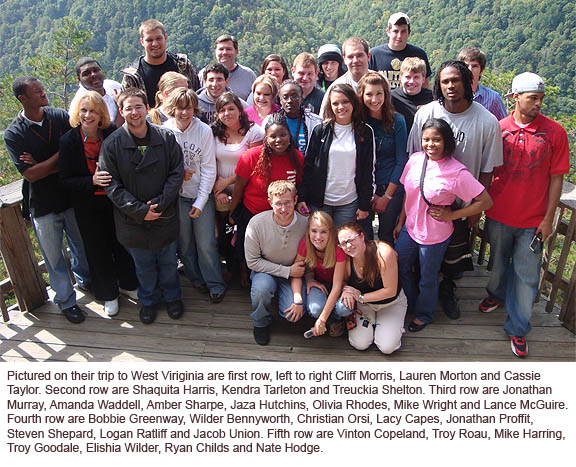Students, faculty and staff from Tusculum College recently spent time learning about the difficult lives coal miners and their families faced during the early days of coal mining and living in mining communities, as well as the economic difficulties many of those towns still face today.
Sixteen students and their staff and faculty mentors visited Whipple, W.Va., as part of a cross-curriculum study on the book, “The Glass Castle,” by Jeannette Walls.
The book, set in part in West Virginia, is a memoir of the author’s difficult upbringing dealing with parental alcoholism, neglect and difficult economic circumstances.
According to Amanda Waddell, director of career development at the College and a staff mentor for the Murdock Circle Living Learning Community, the trip was a culmination of the group’s study of the book across several courses, including English, psychology and environmental science.
Participating in the educational excursion were students from the Murdoch Learning Community and the Quest Learning Community. The learning community concept at Tusculum College includes students with similar interests or backgrounds living together and taking the same course load in order to create a shared learning environment. According to Waddell these communities allow for support, in addition to what is already provided by the College, through shared experiences and additional staff and faculty mentors.

The groups read “The Glass House” for their English class, but also addressed the plot’s concepts of extreme poverty and parental neglect in their psychology class and the environmental effects of coal mining in their environmental science course. The trip to West Virginia was a culminating experience for the study unit, said Waddell.
The Whipple area was selected because of its similarity to the setting of the book, a destitute coal mining town in West Virginia.
The students started with a visit to Concord University outside of Beckley, W.Va., where they met some of the faculty who discussed former and current issues with areas such as Whipple.
Several students at Concord University were natives to the area and talked to the Tusculum students about what it was like for them growing up in such poor economic conditions.
“It was interesting to hear from them that many of them did not have plans to leave the area,” said Waddell. “They have a real sense of place and plan to return there even through there are no jobs.”
A geologist at Concord also talked with the students about the environmental impact of coal mining, particularly the current practice of mountain top removal, as well as health risks associated with the mining industry.
“The trip was excellent,” said student Marc Wright, a freshman from Greeneville. “We learned a lot about coal mining and saw a site where mountain top removal had happened.”
Whipple was a former coal camp and community, and the students and their mentors had the opportunity to drive through that area and see the former housing and company store. It was also at the former coal camp that the students encountered the highlight of their trip – a one-woman, first-person drama about life in the coal camp.
“Coal Camp Memories” is created from a collection of oral histories from the area. The play was performed by Karen Vuranch, a noted storyteller and actress and depicted three stages of life in a coal camp as seen by a child, wife and widow. She was accompanied by a duo performing folk music from the area.
“It was an amazing performance,” said Waddell. “The students really enjoyed it and were engaged in the stories.”
The stories focused on the poverty, which controlled all aspects of their lives, as well as the diversity that existed with so many immigrants living in the coal camps. In addition, it focused on first-person stories that really told about daily life in the times the camp existed.
“It was really learning in action,” said Waddell. “Students discovered some things in the book they may not have been aware of, and this trip made those situations real.”
“When we drove through the coal camp, many of the houses are still there and people still live in them,” Wright said. He added, “I’ve never done anything like this, it was so interesting to see some of the things that the book talked about.”
Others participating in the trip included Billie Ann Pace, Academic Resources counselor; Bobbie Greenway, Academic Resources counselor; Heather Patterson, assistant professor of English; Dr. Troy Goodale, assistant professor of political science; Dr. Angela Keaton, assistant professor of commons and history; Ronnie Sams, adjunct instructor of mathematics; and students Amber Sharpe, Jacob Union, Marc Wright, Cliff Morris, Lauren Morton, Cassie Taylor, Shaquita Harris, Kendra Tarleton, Treuckia Shelton, Jonathan Murray, Jaza Hutchins, Olivia Rhodes, Lance McGuire, Wilder Bennyworth, Christian Orsi, Lacy Capes, Jonathan Proffit, Steven Shepard, Logan Ratliff, Vinton Copeland, Troy Roau, Mike Harring, Elishia Wilder, Ryan Childs and Nate Hodge.


